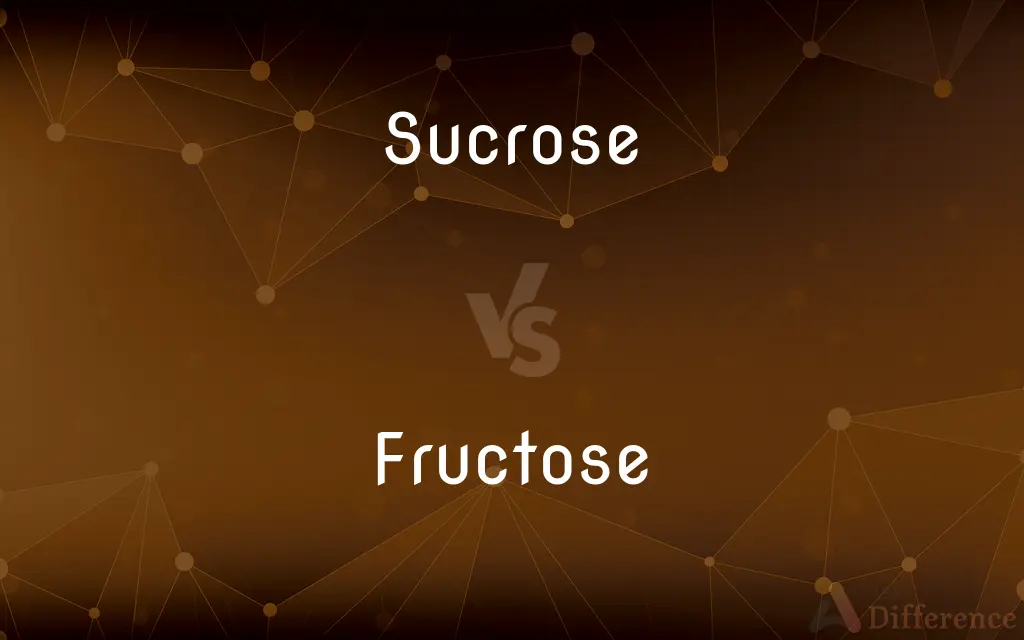Sucrose vs. Fructose — What's the Difference?
By Tayyaba Rehman & Fiza Rafique — Updated on April 18, 2024
Sucrose, a disaccharide, consists of glucose and fructose units, commonly used as table sugar, while fructose is a monosaccharide, sweeter and found naturally in fruits.

Difference Between Sucrose and Fructose
Table of Contents
ADVERTISEMENT
Key Differences
Sucrose, often known as table sugar, is a disaccharide composed of glucose and fructose, used extensively in cooking and baking. Fructose, on the other hand, is a simpler sugar, a monosaccharide that occurs naturally in fruits, honey, and some root vegetables.
In terms of sweetness, fructose is notably sweeter than sucrose. This characteristic makes fructose a common sweetener in foods and beverages where less sugar is required to achieve the same level of sweetness.
The metabolism of sucrose involves its breakdown into glucose and fructose in the body, a process that requires an enzyme called sucrase. Fructose is metabolized directly by the liver, bypassing the pathways used by other sugars, which can lead to different health impacts.
Sucrose is commonly extracted from sugar cane or sugar beets, making it a major product in global agriculture and trade. Whereas fructose is extracted from fruit sources or derived from sucrose itself when commercial fructose is produced.
Regarding health implications, excessive consumption of sucrose can lead to typical sugar-related health issues like dental caries and type 2 diabetes. Fructose, while also linked to similar health risks, has additional concerns such as its role in fatty liver disease due to its unique metabolism.
ADVERTISEMENT
Comparison Chart
Type of Sugar
Disaccharide (glucose + fructose)
Monosaccharide
Common Sources
Sugar cane, sugar beets
Fruits, honey, root vegetables
Sweetness
Less sweet than fructose
Sweeter than sucrose
Metabolism
Broken down into glucose and fructose
Directly metabolized by the liver
Health Implications
Dental caries, type 2 diabetes
Fatty liver disease, obesity risks
Compare with Definitions
Sucrose
A sugar composed of glucose and fructose, used widely as a sweetener.
Sucrose is often added to coffee to enhance its sweetness.
Fructose
Has a lower glycemic index than most other sugars.
Fructose causes a slower rise in blood glucose than sucrose.
Sucrose
Has a moderate impact on blood glucose levels.
Consuming sucrose can cause a spike in blood glucose levels due to its glucose component.
Fructose
A naturally occurring monosaccharide found in many plants.
Apples contain about 6% fructose by weight.
Sucrose
Commonly extracted from sugar cane and sugar beets.
The sucrose content in sugar beets can reach up to 20% of the root weight.
Fructose
Common component of high-fructose corn syrup.
High-fructose corn syrup is often used in sodas and processed foods.
Sucrose
Used extensively in baking and cooking.
Sucrose caramelizes at high temperatures, adding flavor and color to baked goods.
Fructose
Sweeter than glucose and sucrose, allowing for less use in foods.
Fructose is used in reduced-calorie foods due to its high sweetness.
Sucrose
Breaks down into glucose and fructose during digestion.
Sucrase enzymes in the intestine cleave sucrose into glucose and fructose.
Fructose
Metabolized directly by the liver.
Excessive fructose consumption can stress the liver, leading to health issues.
Sucrose
Sucrose is made up of one molecule of glucose and one molecule of fructose joined together. It is a disaccharide, a molecule composed of two monosaccharides: glucose and fructose.
Fructose
Fructose, or fruit sugar, is a ketonic simple sugar found in many plants, where it is often bonded to glucose to form the disaccharide sucrose. It is one of the three dietary monosaccharides, along with glucose and galactose, that are absorbed directly into blood during digestion.
Sucrose
A crystalline disaccharide of fructose and glucose, C12H22O11, extracted chiefly from sugarcane and sugar beets and commonly known as table sugar. Also called saccharose.
Fructose
A sugar of the hexose class found especially in honey and fruit.
Sucrose
(carbohydrate) A disaccharide with formula C12H22O11, consisting of two simple sugars, glucose and fructose; normal culinary sugar.
Fructose
A very sweet monosaccharide sugar, C6H12O6, occurring in many fruits and in honey, and used as a preservative for foodstuffs and as an intravenous nutrient. Also called fruit sugar, levulose.
Sucrose
A common variety of sugar found in the juices of many plants, as the sugar cane, sorghum, sugar maple, beet root, etc. It is extracted as a sweet, white crystalline substance which is valuable as a food product, and, being antiputrescent, is largely used in the preservation of fruit. Called also saccharose, cane sugar, etc. At one time the term was used by extension, for any one of the class of isomeric substances (as lactose, maltose, etc.) of which sucrose proper is the type; however this usage is now archaic.
Fructose
(carbohydrate) A monosaccharide ketose sugar, formula C6H12O6.
Sucrose
A complex carbohydrate found in many plants and used as a sweetening agent
Fructose
Fruit sugar; levulose.
Fructose
A simple sugar found in honey and in many ripe fruits
Common Curiosities
Where is fructose most commonly found?
Fructose is most commonly found in fruits, honey, and some root vegetables.
Why might someone choose fructose over sucrose?
Due to its lower glycemic index and greater sweetness, fructose can be a better choice for those managing blood sugar levels and caloric intake.
What are the health implications of consuming too much fructose?
Excessive fructose consumption can lead to liver stress, insulin resistance, and increased risk of metabolic syndrome.
What dietary considerations should be taken with fructose?
Fructose should be consumed in moderation, especially by those with fructose intolerance or diabetes.
Can sucrose be considered a natural sugar?
Yes, sucrose occurs naturally in plants, particularly in sugar cane and sugar beets.
Which sugar has a lower glycemic index, sucrose or fructose?
Fructose has a lower glycemic index compared to sucrose.
What is sucrose commonly known as?
Sucrose is commonly known as table sugar.
What is the main difference in digestion between sucrose and fructose?
Sucrose must be broken down into glucose and fructose before absorption, whereas fructose is absorbed directly.
How does the body process sucrose?
The body breaks down sucrose into glucose and fructose using the enzyme sucrase.
What are the benefits of using sucrose in foods?
Sucrose provides a balanced sweetness and is effective in texture and color development in baked goods.
What are some common uses of sucrose in the food industry?
Sucrose is used in candies, desserts, baked goods, and as a general sweetener in various food products.
Is fructose sweeter than sucrose?
Yes, fructose is sweeter than sucrose.
How does the sweetness of fructose impact its usage in foods?
Due to its high sweetness, less fructose can be used to achieve the same level of sweetness as other sugars, which is beneficial for reducing overall calorie content.
How do manufacturers use fructose commercially?
Manufacturers use fructose primarily in the form of high-fructose corn syrup, which is used in beverages and processed foods.
What role does fructose play in the liver?
Fructose is metabolized by the liver, where it can be turned into glucose or stored as fat.
Share Your Discovery

Previous Comparison
Acrylate vs. Methacrylate
Next Comparison
Seasoning vs. FlavoringAuthor Spotlight
Written by
Tayyaba RehmanTayyaba Rehman is a distinguished writer, currently serving as a primary contributor to askdifference.com. As a researcher in semantics and etymology, Tayyaba's passion for the complexity of languages and their distinctions has found a perfect home on the platform. Tayyaba delves into the intricacies of language, distinguishing between commonly confused words and phrases, thereby providing clarity for readers worldwide.
Co-written by
Fiza RafiqueFiza Rafique is a skilled content writer at AskDifference.com, where she meticulously refines and enhances written pieces. Drawing from her vast editorial expertise, Fiza ensures clarity, accuracy, and precision in every article. Passionate about language, she continually seeks to elevate the quality of content for readers worldwide.
















































